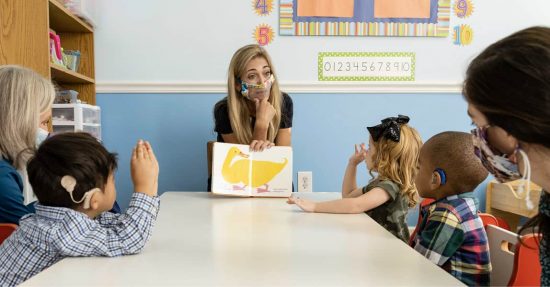Breaking Through the Sounds of Silence
A two-year-old child is hearing for the first time thanks to a cochlear implant. But helping that child learn to listen and then speak are the next steps. That’s what Tracy Edenfield (’98, ’03, ’06, ’10, ’20) does every day as the director of the Sound Start program at Savannah Speech and Hearing.
“It’s not like a pair of glasses that you put on and can suddenly see,” said Edenfield. “It doesn’t work like that because the brain is developing language from birth. So a deaf child that has been implanted has to make up for that lost time in learning to speak.”

Why Auditory Verbal Therapy?
The technology available to very young children who are profoundly deaf has improved dramatically in recent years with the development of multi-channel cochlear implants. Children as young as 10 months of age can now receive the implants. But those children, even with a cochlear implant, have a language delay due to their infancy being spent in silence.
“What we are seeing with the improvement of this technology, is that the therapy has to match the technology,” says Edenfield. “So that’s why auditory verbal therapy is so important.”
The program Edenfield directs develops the listening and speaking skills of deaf children with cochlear implants or hearing aids, without the use of sign language or an interpreter.
“We build language from the bottom up because this is the child’s first exposure to it,” said Edenfield. “The way that we make connections is by reading picture books. What has been the major challenge with deaf students in the past has been the delay in auditory verbal development that causes reading problems. You won’t see that with a deaf child that has been implanted and has been on an auditory verbal track because we teach so strongly out of books.”
The children first experience therapy in a “mommy and me” program shortly after implantation, then at age two they enter Edenfield’s program and continue until K-5 readiness. Following that, the children are ready to attend school with their peers. They don’t need special educational programs.
Dream Come True
“This is my dream,” said Edenfield. “This is what I’ve always wanted to do, help those with this level of disability be successful in a hearing world, to be right next to their hearing peers, making those same grades, those same achievements.”
Edenfield graduated in May with her Ed.D. in curriculum studies, her fifth degree at either the Armstrong or Statesboro campuses.
Edenfield credits her professors in the Department of Curriculum, Foundations and Reading for seeing her through her doctorate under very trying circumstances.
“I got really sick and my dad died tragically,” said Edenfield. “People asked me, ‘why don’t you take a break, step back for a little while?’ But not Dr. He, Dr. Weaver, Dr. Chapman, Dr. Williams-Johnson or the others. They just pushed me and supported me. I could not have done it without them.”
Edenfield is the epitome of True Blue.
“Anybody that chooses Georgia Southern has chosen a team that is there to support you. They don’t want to see you fail. They want to see you succeed. And I think they take it personally. We’re a reflection of them. When we succeed, they succeed.” – Liz Walker
